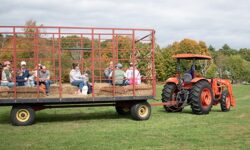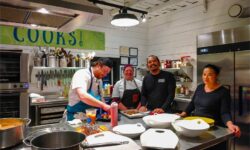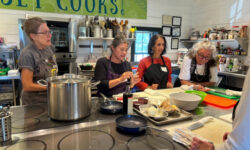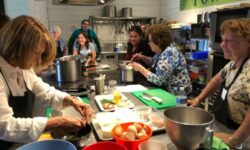[ccfic caption-text format="plaintext"]
By Alex Oliveira
Hometown Weekly Reporter
Powisset Farm hosted a cooking class taught by cookbook author Leigh Belanger in their barn-kitchen last Wednesday afternoon.
With sauces sizzling and popping, knives clunking on cutting boards, and steam billowing out of pots and ovens, Belanger walked seven students through the techniques and processes of preparing ingredients, cooking them, and arranging them in a delicious and eye-catching way.
The class was one of the many cooking classes that take place in the Powisset Farm kitchen throughout each month, each of which has a different ethnic or technique-based theme. This class focused on European country-style cooking, and consisted of braised chicken, polenta, roasted carrots, and poached pears.
Boston-based and educated in the culinary arts, Belanger was just featured on “Chronicle” after the publication of her newest cookbook, “My Kitchen Chalkboard,” which was inspired by her practice of setting a menu of family meals at the outset of each week, and then cooking those dishes for a large and hungry family.
Belanger was adept at teaching as she went, breading chicken thighs, guiding a student on how best handle a knife while chopping greens for pesto, then checking a pot of sweating celery while giving quick lecture on how she was cooking it.
“I’m about to use a technique called sweating. I’m on a medium to low heat, then you cover the celery so that the steam that accumulates will help cook it. And that keeps those delicate flavors contained.”
It isn’t wrong to think that a barn is a strange place to host a cooking class.
To get to the warm kitchen, one passes through what must have served as a stable in another day. There are ribbons on the walls from prize-winning pigs, barn cats peer around corners, and coverall-clad farmhands rumble about the cold fields in ATVs.
“I think it’s that different place and atmosphere that draws people here,” said Events and Program Assistant Jamie Picard. “People nowadays want to be more connected with their community. They want to know where their food comes from. It’s a very real way to experience farm-to-table.”



























